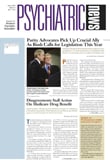A large group of mood-disorder researchers brought together by the National Depressive and Manic-Depressive Association (NDMDA) has issued a consensus statement on the use of placebos in clinical trials involving patients with mood disorders. The consensus panel reports that placebos are appropriate in trials of new psychotropic medications, if the sample population is effectively monitored, controlled, and screened for serious adverse events, such as suicidal ideation.
“This statement underscores that the patient’s safety and well-being must come first, while at the same time stressing the importance of placebo in developing new treatment options,” said Dennis Charney, M.D., chief of the Mood and Anxiety Disorder Research Program at the National Institute of Mental Health and chair of the NDMDA’s scientific advisory board. He also was chair of the consensus panel and the lead author of the statement.
“Placebos in a drug trial don’t cause harm in the great majority of cases,” Charney said in a prepared statement, “if there’s adequate monitoring and high-risk patients are removed from the study.
“Patients with mood disorders will benefit from clinical trials that include a placebo element because trials without placebo may yield unreliable results or lead to false claims about drug performance.”
The statement, co-written by 33 scientists, patient advocates, and patients, appeared in the March Archives of General Psychiatry.
The panel studied an array of issues surrounding the use of placebos in clinical trials, including arguments that placebo controls are never ethical when effective treatments are available for a particular disorder—a position endorsed in a revision of the Declaration of Helsinki in 2000. After considerable debate, the statement reflected the authors’ consensus that placebo use is ethically justifiable in the case of affective disorders, when there is no evidence that irreversible harm will be associated with patients who are assigned to placebo.
In addition, the statement notes that although patients with mood disorders have inherently high placebo response rates, clinical trials that do not include a placebo control would require significantly larger sample populations to show statistically valid differences between treatment groups. That, the authors wrote, would “unnecessarily expose a large number of people to an unproven medication that may be ineffective, poorly tolerated, or even toxic.”
“Placebo-controlled trials are not ethical when patients are inadequately protected from serious risk, permanent disability, or death,” Lydia Lewis, executive director of NDMDA, emphasized in a press release. “Another safety measure is to shorten the length of a patient’s exposure to placebo. That’s very important to ensure a patient’s protection. In addition, when patients in a trial respond exceptionally well to a trial drug, it should be made available at an affordable cost after they complete the study.”
The authors called for more research on affective disorders, especially bipolar disorder, which they termed “highly variable, complex, and challenging. Bipolar disorder in adults is remarkably understudied, and studies in adolescents, children, and the elderly are virtually nonexistent.”
The statement recommends that future research should be focused on the ethical conduct of studies involving placebo. “This includes improved informed consent procedures, comprehensive safety protocols to limit risks, immediately informing patients and their poststudy clinicians of the treatments they received during the trial, and poststudy access, whenever possible, to trial drugs.”
In an editorial on the consensus statement in the April 10
Journal of the American Medical Association, David Kupfer, M.D., a professor of psychiatry at the University of Pittsburgh Medical School and a coauthor of the consensus statement, observed that current research, such as the study of St. John’s wort in depression (
see facing page), highlights the placebo response and offers insight into “the perplexing complexity of the placebo and its ability to cause ‘mischief’ in scientific inquiry.
“This may be nature’s way of providing clues to fundamental aspects of the healing process. It is important to learn from, rather than dismiss, the variability of the therapeutic response,” he wrote.
Arch Gen Psychiatry 59 262
JAMA 287 1853
